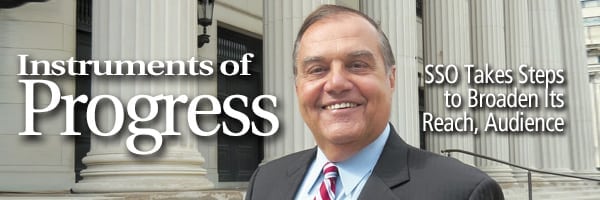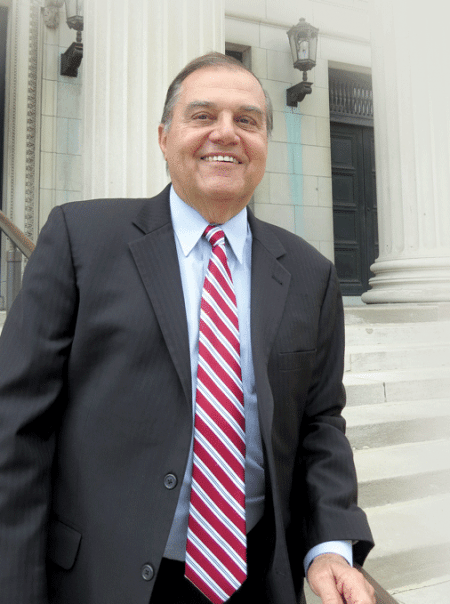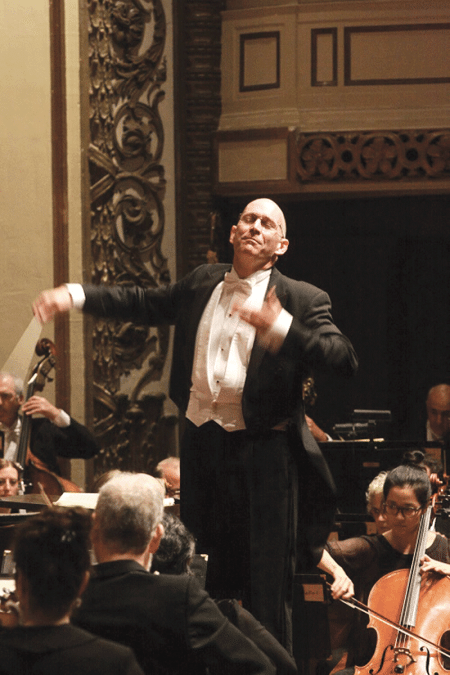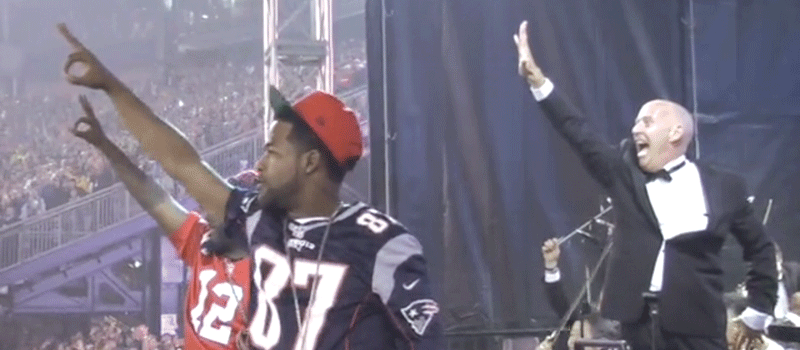
SSO Takes Steps to Broaden Its Reach, Audience
Instruments of Progress

Executive Director Peter Salerno on the steps of Symphony Hall
As it enters its 73rd year, the Springfield Symphony Orchestra does so knowing that, to remain relevant, it must be creative and willing to assume risks as it strives to cultivate new audiences, especially the younger generations. Peter Salerno, who has twice served as interim director of the SSO and took the helm on a permanent basis earlier this year, says the institution is more than up for that challenge.
Peter Salerno said the phone call seemed to come out of left field … or from the 20-yard line, as the case may be.
On the other end was someone from the New England Patriots’ marketing department. She wanted to know if the Springfield Symphony Orchestra, which Salerno was serving then as interim executive director, could have 50 or 60 of its musicians at Gillette Stadium in 24 days for a performance that would celebrate the team’s fourth Super Bowl victory, earned six months earlier, and usher in the 2015 season.
It was an extraordinary request on many levels, and Salerno, who has since dropped the word ‘interim’ from his title, knew he couldn’t say ‘yes’ at that moment, as much as he wanted to, knowing what this opportunity would mean for the venerable institution in terms of invaluable and incalculable exposure. Indeed, he would have to consult with Maestro Kevin Rhodes and other members of the team to see if this was even logistically feasible, and then get approval from the SSO board, because this was a venture far outside the orchestra’s traditional mission — and comfort zone, for that matter.
He got the nod from both parties and promptly called the Patriots back, thus setting the wheels in motion for perhaps the most memorable night in the orchestra’s 73-year history.
It was certainly the biggest stage, at least in a figurative sense. Indeed, while the actual performing area was a trifle snug, more than 70,000 people at the stadium and another 35 million watching NBC’s broadcast of the Thursday-night game against the Pittsburgh Steelers saw and heard the orchestra perform “O Fortuna,” the Patriots’ so-called tunnel song, and eventually shared the stage with the rapper T-Pain.
Go HERE for a list of Tourist Attractions in Western Mass.
“It was quite an upbeat moment for us,” said Salerno, using both wordplay and understatement to get his point across. “I recognized this is an opportunity for us to perform, and be relevant, in an area that we never thought we could before.”
In many respects, that performance at Gillette almost a year ago effectively speaks to the aspirations, goals, and challenges that define the SSO moving forward. It was a dramatic attempt to move beyond what would be considered traditional (in terms of both the venue and performing with a rapper), attract new and larger audiences, and greatly improve visibility beyond the confines of Symphony Hall.
There will be a lot more of that — although certainly on a smaller scale — in the months and years to come, as a look at the 2016-17 calendar reveals.
One of things I’m teaching, but also learning at the same time, is that our orchestra must respond to different genres of music to remain in the forefront of the people’s minds.”
In addition to the classical offerings — a Tchaikovsky Gala on opening night (Sept. 24), Brahms’ “Double Concerto” on Nov. 19, and Beethoven’s “Emperor Concerto” on Jan. 21 — the SSO will share the stage with the Irish Tenors two weeks before St. Patrick’s Day, and will wrap up the season on May 13 with something called Video Games Live!
As that name suggests, this will be an immersive concert that features the musical scores from the greatest video games of all time — as those games appear on large screens around the hall, with synchronized lighting and other special effects.
Those unique events, and especially the final one, are designed to draw more diverse audiences, particularly young people, a stern challenge now facing all arts institutions.

Peter Salerno says the main challenge for SSO and its conductor, Kevin Rhodes (pictured), is audience development.
To meet this challenge head-on, the SSO must do something not exactly within its character, historically, and that is to be far more willing to take risks, said Salerno, adding quickly that the board has essentially greenlighted such an approach to business, and so has long-time conductor Rhodes and the rest of the orchestra’s team.
“One of the things I’m teaching, but also learning at the same time, is that our orchestra must respond to different genres of music to remain in the forefront of the people’s minds,” he explained, adding that this is the mindset driving the SSO and forging its schedule for the coming year.
For this issue and its focus on travel and tourism, BusinessWest takes an in-depth look at how the SSO is looking to expand its playing field, in all kinds of ways, and put every definition of the term ‘score’ into play.
Developments of Note
Looking back on the 24 days after that fortuitous phone call came in from Foxborough, Salerno used all kinds of descriptive phases to characterize them — from ‘long’ to ‘exhilarating.’
“Those were 60-hour weeks,” he said, smiling as he did so because, while the work was sometimes tedious — involving everything from drafting contracts with the Patriots and NBC to insurance matters and a mountain of logistics — it was also very exciting.
This was, after all, the proverbial opportunity of a lifetime, and the SSO was going to do everything in its power to seize the moment.
“This was a surreal moment for our orchestra, and it showed the versatility of our people,” said Salerno as he showed a video of the performance, with the SSO clearly visible to fans amid fireworks and low-lying fog, adding that perhaps the biggest obstacle was creating a sheltered performing area for the orchestra, something the Patriots organization pulled together. And demand for it was warranted because it rained in the hours leading up to the performance and stopped only moments before it was set to begin.
In many respects, dealing with cloudy forecasts and unsettled skies — in a figurative sense — has been a part of doing business for the SSO in recent years. Like all arts venues, it has seen its traditional audiences age, and with that demographic shift a need has emerged to embrace change and, as mentioned earlier, risk.
The Patriots performance was, again, a significant manifestation of this trend — this was believed to be the first time a full symphony orchestra had performed at such an NFL ceremony and perhaps the first time an orchestra of this type had appeared with a rapper — but there have been others, with more planned for the year ahead.
“We’re participating in the creation of new horizons for symphonic sound,” he said, adding that orchestras across the country are facing the same challenges. “And we’re going to keep pushing, and bringing world-class talent to the Springfield arena.”
Leading the orchestra through this intriguing period is Salerno, now 75 years old, who brings a wealth of experience in business, work with nonprofit institutions, and the SSO itself, having been a trustee for many years and serving not one, but two stints as interim executive director.
Described by many as a stabilizing influence to the operation, he succeeds Audrey Szychulski, who left the SSO in the spring of 2015 after less than two years at the helm.
Salerno brings a diverse résumé to the post, including everything from stints as COO of Providence Hospital and president and CEO of Brightside to work coordinating new retail stores for Taylor Rental Corp.; from a short stint running an operation that managed college bookstores to his own business, PTS Consulting, launched nearly a decade ago.
Over the years, he’s taught several graduate-level business courses at Bay Path University and Clark University in Worcester, with a focus on business strategies for nonprofit organizations, marketing, and finance.
In his latest role with the SSO, he’ll be applying the lessons that he teaches, especially as they apply to the most pressing challenge facing the institution — audience development.
Drumming up Interest
There are many components to this assignment, he said, listing everything from imaginative artistic events to new and different types of talent that will share the stage with the SSO, to a variety of touches that will make SSO performances true happenings.
With that, he took out a copy of the schedule for the coming year and started running his finger down the listings.
His first stop was the holiday concert, set for Dec. 3, although Salerno said ‘concert’ doesn’t go far enough, so the actual wording on the schedule is Holiday Extravaganza.
It was chosen to encapsulate the theme — “It’s a Wonderful Life” — and describe the sum of the activities and events, including a Christmas tree outside Symphony Hall, a visit from Santa, perhaps a reindeer if one can be secured, and more.
“We want to make coming to the symphony not just an event, but an entire presentation,” he explained. “We don’t want it to just be sitting in the audience for two hours.”
Elaborating, he said the SSO will again coordinate visits whereby ticketholders gather at spots in area communities, are then bused downtown for dinner at various downtown restaurants, and then taken to Symphony Hall.
“We’re trying to make it convenient for people to come to us,” he explained. “And we view this as an opportunity to attract more people to Symphony Hall.”

SSO conductor Kevin Rhodes is seen here with rapper T-Pain at the performance last fall at Gillette Stadium to usher in the Patriots’ new season.
His next stop, schedule-wise, was several months later, in early March, when the Irish Tenors, well-known to PBS audiences, will take the stage.
Similar to the holiday performance, this will be more than a concert, said Salerno, adding that it will be more like a celebration of Irish heritage, one featuring many moving parts.
The full itinerary is still a work in progress, he said, but in the days leading up to the performance, there will likely be an Irish-style dinner featuring luminaries and elected officials of Irish descent, and other touches, such as a possible discussion of the 1916 uprising.
“We’re trying to build the activities and the service level to a higher plane than we have in the past,” he explained, adding, again, that the goal is to move beyond the music and create experiences.
That will certainly be the goal for the season finale, Video Games Live!, which is the most dramatic example to date of the orchestra’s efforts to attract young people.
“Some of our donors have expressed interest in efforts to create continuity with younger audiences and thus lower the demographic age of our attendees,” he noted. “And we determined that one of the areas where we could start making an impact was with junior-high and high-school students.”
To that end, the SSO will contract with a California-based organization to bring the music from video games, orchestral sound, and a host of special effects together in the same venue on May 13.
“There are so many opportunities to show off our talents, and this might be a good one,” he said, adding that the show, similar to others staged in other cities in recent years, should prove to be an impactful vehicle for introducing young people to the orchestra and beginning the process of turning them into life-long audience members.
The other performances on the schedule will bring some of these elements to the table, said Salerno, adding, again, that developing new audiences and remaining relevant in the years and decades to come will require the SSO to continue to push the envelope.
“The board has allowed us to take more risk in terms of encouraging us to look at new genres and new methodologies,” he said. “I think it’s essential that we take advantage of the strengths that we have and marry them to the interests of our population, while at the same time preserving the outstanding classical performances that attract people from all over.”
Reaching a Crescendo
Returning to that now-famous phone call one more time, Salerno acknowledged that he allowed himself to think about why the Patriots were calling the SSO, and whether this was the team’s first call.
But only for a brief moment, and not in a deep manner, he told BusinessWest, noting that doing so would be counterproductive at a time when the sentiment should be, ‘why not call the SSO first?’
“One of the things I’ve learned over the years is that you don’t look a gift horse in the mouth,” he joked, before taking the discussion to a much higher plane.
“If we ask that question — ‘why us?’ — we’re probably not thinking of ourselves as being as good as we really are, so I didn’t ask that question,” he explained. “Instead, I said, ‘let’s just make this happen.’ When they called us, I just assumed they wanted us number one; I believe in this orchestra.”
These sentiments — not to mention the ‘let’s just make this happen’ remark, which refers to far more than a performance at a football game — could only be described as a winning attitude, one where the orchestra is, quite literally, taking the ball and running with it.
George O’Brien can be reached at [email protected]





